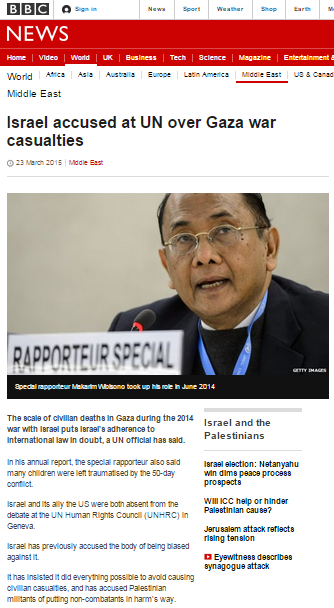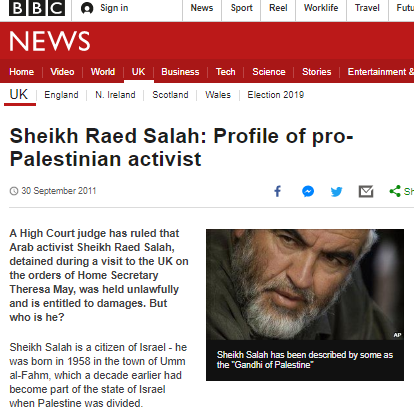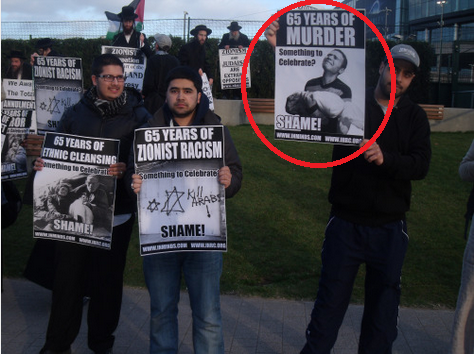Three times a year the UN Human Rights Council turns its attentions to ‘Agenda item 7’.
“While all 193 countries of the world are addressed under Agenda Item 4, “Human rights situations requiring the world’s attention,” only Israel gets its own special treatment, under Agenda Item 7, “Human rights situation in Palestine and other occupied Arab territories .””
It is precisely that long-existing disproportionate focus on Israel which prompted the US Secretary of State to make the following statement earlier this month:
“No one in this room can deny that there is an unbalanced focus on one democratic country,” he said, decrying the fact that no country other than Israel has a permanent agenda item on the council’s schedule. “The (council’s) obsession with Israel actually risks undermining the credibility of the entire organization.”
And of course the HRC is not the only UN body to display such politically motivated bias: just last week, for example, its Commission on the Status of Women singled out one country alone for censure in its latest resolution.
That context is obviously relevant to any article written about UN HRC statements concerning Israel but readers of the BBC’s March 23rd article titled “Israel accused at UN over Gaza war casualties” were not provided with any such objective background. Instead, readers found the following versions of the BBC’s standard ‘Israel says’ formulation in its fourth and thirteenth paragraphs:
“Israel has previously accused the body of being biased against it.”
“In Israel, the foreign ministry told Reuters that the UN’s annual debate about human rights in Gaza and the West Bank “negatively singles out Israel and Israel every year asks its friends on the council not to express themselves”.”
The article misleads BBC audiences by the use of unqualified quotes from the latest ‘special rapporteur’ (with no mention of the Arab League’s involvement in his appointment to the post) suggesting that the number of civilian casualties in a conflict is indication of violation of the Law of Armed Combat.
“The scale of civilian deaths in Gaza during the 2014 war with Israel puts Israel’s adherence to international law in doubt, a UN official has said. […]
At the meeting, special rapporteur Makarim Wibisono criticised Israel’s conduct during the July-August conflict.
“The ferocity of destruction and high proportion of civilian lives lost in Gaza cast serious doubts over Israel’s adherence to international humanitarian law principles of proportionality, distinction and precautions in attack,” he told the council.”
However – as noted (page 35 onwards) in the recent report ‘2014 Gaza War Assessment’– that is not a sound legal argument.
“One of the asymmetries that irregular forces seek to take advantage of against their conventional opponents – especially if that opponent is a liberal democracy – is commitment to the rule of law. States that respect their own citizens’ rights and observe the rule of law generally demand that their armed forces conduct operations in accordance with all applicable domestic and international law. This is rarely the case among guerillas, insurgents, terrorists and non-state armed groups. Unconventional adversaries frequently seek to exploit the presence of civilians, believing it will provide functional immunity from law-committed militaries.
These tactics are emboldened by widespread misunderstanding of LOAC not just among warring parties but also media, observers and the international public – a misunderstanding built on the false assumption that the law prohibits the infliction of any and all civilian casualties. In fact, LOAC tolerates the infliction of harm to civilians and destruction of civilian property during armed conflict, prohibiting such harm only when it is inflicted deliberately, or when it is assessed as an excessive incidental consequence of a deliberate attack on a lawful target. However, the persistence of misconceptions about LOAC’s content and requirements will enable continued manipulation of legal arguments, risk incentivizing further exploitation of civilian populations and thereby risk greater civilian deaths in future urban conflicts. For this reason, clarity on LOAC’s requirements is paramount.”
And, as Col Richard Kemp has noted:
“It is worth emphasizing that proportionality is not, as often believed by critics of Israel, a relationship between the numbers of casualties on either side in a conflict, but a calculation that considers whether the incidental loss of civilian life, injury to civilians or damage to civilian objects would be excessive in relation to the concrete and direct military advantage anticipated in an attack.”
Neither does the writer of this article clarify to readers that the number of civilian casualties in the Gaza Strip in July and August 2014 (which the BBC has not independently verified since the end of the conflict) is not a “high proportion” at all in comparison to other conflicts.
Readers again came across the “Israel says” formulation (a way of supposedly ticking the impartiality box without actual BBC endorsement of statements) in the following section of the article:
“He [Wibisono] lamented “acute” needs in Gaza, warning that Israel’s continued “blockade keeps Gaza in a stranglehold which does not even allow people to help themselves”.
Israel says its tight restrictions over Gaza’s northern and eastern borders and coastline are vital to protect it from attacks by militants.”
No effort is made by the BBC to provide readers with objective and factual information regarding the reasons for the border restrictions and naval blockade, including the smuggling of weaponry to terrorist organisations.
At no point since the start of the 2014 conflict has the BBC made even a semblance of an effort to speak truth to UN power. Despite the UN HRC’s record of abysmal bias towards Israel, the corporation has uncritically quoted and promoted statements made by its officials and unquestioningly adopted and amplified UN provided casualty figures – regardless of their highly problematic origins.
Any media organization which took its fifth estate role seriously and really did aspire to be “the standard-setter for international journalism” would of course do more than merely provide free pubicity for regurgitated politically motivated statements from a body which discredits itself day by day.
Related Articles:
Law of Armed Conflict, Gaza and the BBC
JCPA e-book on Operation Protective Edge




